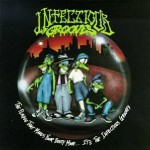Singer Mike Muir has been the only constant member of the band Suicidal Tendencies during its three decade existence. The band started out as a SoCal hardcore punk rock band featuring an aggressive sound and Muir’s raging lyrics that resonated with the era’s disaffected youth. Along the way, the band gained notoriety from frequent violence at their shows and alleged gang affiliations, later denied by Muir.
Suicidal Tendencies’ first, self-titled album came out in 1983, and the song “Institutionalized” received significant airplay on MTV, the first hardcore punk rock song to do so. Over time, Suicidal Tendencies evolved in a thrash metal direction, but they always retained a connection with their hardcore roots. Their latest album, 13, was released in March.
Muir is also the singer for the funk metal band Infectious Grooves, and has released solo albums as Cyco Miko.
This interview was done by phone on 12/16/13, and was used for a preview article for the Suicidal Tendencies show on 12/21/13 at the Majestic Ventura Theater.
Jeff Moehlis: What can we look forward to at the upcoming show?
Mike Muir: With Suicidal it’s an interesting thing. We just put out a new record this year, and this is the second time we’ve toured in the States for it. We’ve been some places we haven’t been before. We headlined a festival in Indonesia. We always go to Europe in the summertime doing festivals, and just before this we did thirteen shows in France. Everything’s a little bit different.
But one of the things we’ve found is that you’ve got the whole crew of people that haven’t seen you in twenty years, you know, and you have the people that aren’t even twenty years old, they’re seeing you for the first time. Then you have the families, at least three or four, where the people are like, “We met at a Suicidal show”, and they’ve got two or three kids and they’re bringing their kids. Their first show was a Suicidal show and they want their kid’s first show to be a Suicidal show. So it’s a really interesting mixture. You start out with the bucket-list people, so to speak, and the people who haven’t seen you in so long and are being nostalgic. We’re not trying to be nostalgic – we’re here to remind them why they love the band, to fall in love with the band, and to make them feel bad that they haven’t seen us in a long time.
I think that all across the board, regardless of their perspective, people are generally really surprised, especially when we’re as “old” of a band as we are. I think one of that things people say is, “Dude, I just saw…”, and they’ll mention some band that I won’t say, and they go, “and he looked old. It was like a Vegas thing almost. They’re just going through the motions”, or this or that. And when people see Suicidal they know we’re not going through the motions.

JM: You mentioned the new album, 13. For the people who haven’t heard it yet, can you tell us a little bit about that album?
MM: One thing for us, we’ve always had a different approach to music than most people. Most people, they do music that they think or they hope people will like. That’s the purpose. Our priority, my personal priority has always been doing something that I like. Our first record, when it came out, the punk bands said it sucked. The metal ones said it sucked. And we weren’t really concerned about it, because we weren’t looking for their accolades or whatever.
It changed, over time things have changed. People have always put down our records when they come out, and later on somehow they become great records or classic. I think a lot of times so much of music is done for what people think will happen at the time. We’re not concerned with how a record is perceived when it first comes out, but ten years or twenty years from now, people that aren’t even born now, when they hear it for the first time, what they think. That’s a lot more important.
And then the other criterion we look at is, “Is this something that we love?” If we could go back in time and play, for instance, this record when I was 16 years old. If I heard this record when I was 16 years old, I’d be going, “Fuck! Who’s this?” I think that’s the way we’ve consistently always been. We want to challenge people.
I wasn’t the type of 16 year old who would just fit into a trend, all metal, or all punk, or this and that. There were certain things that I liked for certain reasons. And the majority of it I didn’t like. So we’re looking more for that uniqueness rather than that generic style.

JM: It’s hard to believe that the first Suicidal Tendencies album is 30 years old. What was the Southern California music scene like when you guys released that?
MM: Well, we weren’t really in the music scene too much. Punk rock wasn’t really a very big thing. People would brag about selling, you know, 5,000 copies of their records. So there wasn’t really an audience, and we didn’t fit into what was punk rock at the time. Like I said, all the punk bands said we sucked, “it’s metal”, and we were just the worst thing that could ever happen. But, like you say, now it’s a punk rock classic.
I don’t really get into that too much, how to fit in. My dad always said the only ones who try to fit in are the ones who can’t stand out. If you try to be liked, you’re going to end up being miserable. A surefire way to hell. The most important thing is to do things that you know that you will like, not just for the moment but later on, when you’re older, that you’ll be proud of. So that’s the approach we’ve always had. Not that short term, momentary moment, but something that we’ll always look back on and have no regrets. We did it the way we wanted for the right reasons. Not for anybody else, but it’s something that I felt, and something that I felt was important. That’s not just music, that’s life. That’s the way I was brought up.
JM: The band’s best known song has to be “Institutionalized”. I remember listening to that when I was a teenager in Iowa, probably around ’86 or so, a few years after it came out. How did that song come together? Is that semi-autobiographical?
MM: At the time, they started having all these things about sending people to these camps and stuff, all the “problem kids”. They used to have these things in the paper – “Does your kid this, and does your kid that?” “Does your kid get angry when things don’t go their way?” Yeah, I do. That’s called being normal. They said, “If the answer is ‘yes’ to four or more of these, they may have a drug or alcohol problem.” I’d never done any drugs and stuff, but according to them I would’ve had a problem. A lot of my friends, at four in the morning these people would come and take them off to these camps and stuff. So a lot of it was stuff that was going on, that was happening around.
The way I look at it, there were parents that never really were parents. Then their kids who are 14 years old, they can’t brag about them, so there must be something wrong with the kid, rather than their parenting skills. So what do they do? They send them off somewhere else rather than see what is really going on and stuff. It’s easier to do that than to communicate. I think that’s the situation.
Kids now, they hear it for the first time and they can totally relate to it. I think that’s great. I think that a lot of people that were young when they felt that way, now they’re older and they have that lesson when they’re having kids, to have that other perspective and to make sure that they don’t have those same problems. I think it’s an important song.
JM: Did Pepsi ever get in touch with you about that song, either positively or negatively? We always called it “The Pepsi Song” back in the day.
MM: No.
JM: As I mentioned, I was in Iowa listening to that song a few years after it came out. Was there ever a point when you were like, “Wow, people in places like Iowa are actually listening to us?”
MM: Well, there were years when we didn’t play the song. It kind of wasn’t there. But, I think, now people perceive punk rock differently than they did, obviously. It’s a lot easier for music to get out. Every station that it got played on, it went to the top requested song. But most people wouldn’t play it because it didn’t fit into a format. I think that’s the problem with life, too many people see it when other people try to do it, but they don’t see it when they do it to themselves. They’re very formatted, whether it’s the way they dress and act, and this and that, stylistically. Rather than just saying, is it good or not? They’re more concerned with the style, or the effect that they’re trying to get across.
Music to me is something… Now, they have music everywhere. The stores, they have music. In elevators they’ve got music, especially for Christmas and all that. It’s there, it’s just background noise. But a really good song, it should make you stop and make you think. As simple as it is, musically, lyrically, you can’t help, no matter what age you are, to stop and listen to it. That’s the beauty of the song. And when you listen, sometimes it offends people. Sometimes they get sensitive about it, depending upon where they’re coming from. And then some people go, “Hey, right on dude.” It’s always good when you feel like someone can give you a voice, not to keep you quiet, but that you can use as a communication tool.
That’s a song that people, especially when they’re older, they say they played it to their parents and said, “This is how I feel. Listen to the song, because you’re not listening to me.”

JM: You’ve been involved with some other bands besides Suicidal Tendencies. I have to ask, with the Infectious Grooves you did a song [“Therapy”] with Ozzy Osbourne. What was that like, and how did that come together?
MM: That was quite an experience. We were in the studio, and when we were doing the record I was talking to the guy that was producing it, and he was asking about the song. I said, “Oh, it’d be really cool to have someone like Ozzy sing on it.” He goes, “Well, give him a call”, and I just started laughing. Like I know Ozzy Osbourne, you know?
And coincidentally enough, two days later Ozzy came into the same studio we were in. There was this knock on the door, and he was there, and I’m like, “Wooh, is this real?” He said [in Ozzy voice], “I heard you wanted to talk to me” [laughs]. Our producer, I guess, had seen him and talked to him and said, “We want to play you this song.” So we put the song on, and he goes, “I love it! I love it!” You know, he was all jumping up and down. So he was like, “Let’s do it right now! Let’s do it!” He just got on there and started singing. At least once or twice everyday we’d hear this little soft knock and open it up, and it was Ozzy. He’d go, “Can you play that song for me again?” Then he’d start jumping up and down again. Then a little while later there’d be a knock, and he’d go “Tell them I’m not here”, because he knew they were coming for him. “Is Ozzy in there again?” So it was a really good experience.
Actually, the video… He asked us to do a tour with him, and it got cancelled because he broke his foot, in Chicago. We were actually shooting the video in Chicago the next day. We were like, “Aw man, he broke his foot. The tour is cancelled. That’s it.” But he wouldn’t let them put the cast on until he did the video. So in the video he actually has a broken foot. He still did it. It was really cool.
JM: What advice would you give to an aspiring musician?
MM: Go to Plan B. I have three kids, and I would not want them to be musicians, in this day and age. I think there’s nothing wrong with loving music. I think music is great. But I think when people ask the question they’re saying, “How do you make money in music?” And you really don’t. If you’re trying to make money in music, then what you’re saying is, “How do I kiss ass? How do I get to be liked?” It’s like the American Idol thing. Whereas I think that there was generally was some validity in the past doing music, just because you didn’t like anything else, you know? And that was part of the motivation of doing Suicidal. We didn’t like what other people were doing.
I’ve said many times, before we did our record one of my best friends came in and he said, “Mike, you know what, you have a chance to do a record. People don’t get that chance. Listen to the radio. You can play that stuff. You can be like the bands on the radio.” And I go, “But I don’t like what’s on the radio.” He’s saying, “What you’re doing isn’t music.” And I go, “I don’t care if you don’t think it’s music. It’s what I like.” I don’t care if other people like it.
Whereas I think people now, when they’re asking “How do you get to be liked?”, that’s totally kind of sad in way. Don’t worry about it. And people all the time will go, “We’re doing this and that”, and I go, “Do you like what you’re doing?” “Yeah”, and they go, “But, but, not this. And we want to do this.” And I go, “Oh, so you want to be liked rather than liking what you’re doing. If you’re not happy liking what you’re doing, you’re talking to the wrong person.” If you like what you’re doing, then whatever happens happens. But people are more into, you know, how you get that American Idol, whether it’s rock or whatever it is, and be popular rather than make great music. A lot of great music people will never hear.
JM: Do you want to set the record straight on anything about your career, any misconceptions floating around?
MM: Oh no, I would be spending the rest of my life doing that. Some of the stuff is so stupid and ridiculous. You know, you just laugh it off. Nowadays, anybody who has one finger can change history, so to speak, or do their history, their story. Really when it comes down to it, it’s really not important regarding who you are, how you are as a person or a parent, your relationships, things like that. So I’m not really concerned about stuff like that.
You know, sometimes it is funny. Someone will say something, ask a question, and I’m like, “What are you talking about?” They’ll say, “Oh, I read whatever on the internet”, and I’ll go, “Great. There you go.”
JM: The upcoming show is just a few days before Christmas. If it’s not too personal, can I ask how does Mike Muir spend Christmas?
MM: Oh, wow – the best way possible. With the family. Nothing better than that. I’ve got three kids.
When you’re young and they say it’s better to give than to receive, you sit there and you’re like, whoever said that doesn’t know what he’s talking about. But when you have kids, and I had a little brother who was twelve years younger than me, when you see younger people year-round then you realize what it is, and you get an understanding. The excitement that they have for the holiday is great.
It’s great, too, because even though they’re young they go, “We’re going to Grandma and Grandpa’s house?” They get really excited about that, too. They totally love the family aspect, and they ask which aunts and uncles are going to be there. That’s great – I love it.


Discussion
No comments for “Interview: Mike Muir”